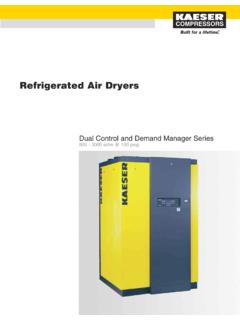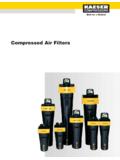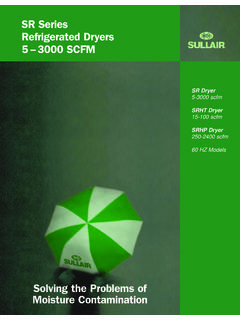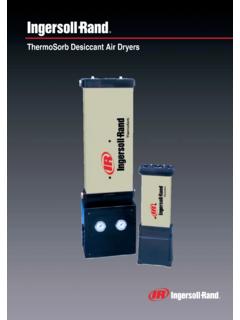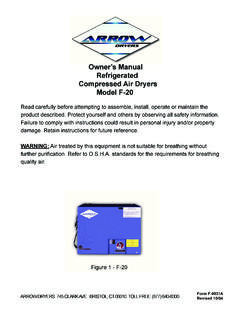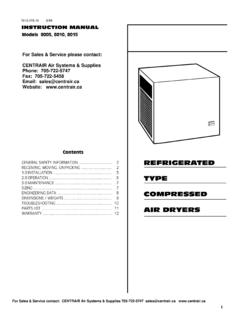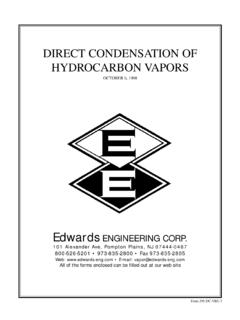Transcription of Cycling Refrigerated Air Dryers - Kaeser
1 Cycling Refrigerated Air Dryers Secotec . 20 - 520 cfm @ 100 psig Why Do We Need Dry Air? shut down, the Secotec Dryers save energy because the refrigerant system As atmospheric air is drawn into a compressor, water vapor is is shut off. introduced as well. During compression, air heats up and is able For example, comparing the TD 61. to hold more water vapor. Cycling dryer with a non- Cycling dryer , Mechanical separators and the TD 61 (at 240 cfm) in single shift filters are used to remove operation (8760 service hours, of which liquid water, yet air remains only 1000 hours are under full load). saturated with water vapor. As saves $930/yr. at $.08/kWhr. air travels through the piping, the vapor cools, condenses Operation and may pass into production Warm compressed air entering the dryer tools and equipment. Using a is initially cooled in the air-to-air heat Secotec Refrigerated dryer exchanger by the cold compressed air eliminates vapor before it leaving the evaporator.
2 This allows for condenses and affects your greater efficiency by reducing the heat load on the refrigeration system. system.. Why Secotec ? The Secotec Cycling control provides maximum efficiency by operating the refrigerant compressor only when necessary. This is achieved by utilizing a thermal storage medium. The refrigerant system cools the medium to a certain temperature, cuts off, and then stands by until the temperature rises to a predetermined level before switching on again. Therefore, the dryer is not wasting energy when the demand is low. A non- Cycling dryer continues to operate even during low demand periods. The air is cooled to the dew point temperature in the lower part of the heat Energy Savings exchanger by a refrigerant* circuit with a thermal storage medium. The conden- The Secotec Cycling control provides As shown in the chart, significant sate formed by the cooling action is the greatest savings during low demand savings are possible on a daily basis.
3 Separated from the compressed air by periods such as evening and night shift. During breaks, low demand periods, and a multi-stage, stainless steel, Air Consumption Over a 24-Hour Period maintenance-free separating system. The automatic condensate drain reliably 100 - The SecotecTM energy saving potential: As soon as there is little or no air drains the water without wasting 90 - demand, the SecotecTM dryer automati- 80 - Morning shift, cally shuts down. valuable compressed air. The chilled air high average air demand 70 - leaving the evaporator is reheated in the % of Full Load 60 - upper part of the heat exchanger before 50 - Evening shift, exiting the outlet. Reheating the com- 40 - low average air demand 30 - pressed air eliminates pipe sweating 20 - down-stream. Night shift, 10 - Air consumption Energy saving potential very low average air demand 0- * All Kaeser Secotec Dryers use environmen- tally-friendly R 134a refrigerant.
4 6 am 12 pm 6 pm 12 am Convenient Features 1 Easy and dryer Construction Reliable Controls All components such as heat exchangers, Control panel includes dew refrigerant circuit, condensate separator, point indicator, on/off switch, and LED's indicating power and drain are conveniently accessible on (active thermal storage). from above when the panels are and compressor on. LED's for removed. Service connections are provid- high dew point are standard ed at the suction and discharge lines to on models TE 91 and up and check the refrigerant circuit. The dryer drain alarm LED is standard on construction and component arrangement TE 121 and TE141. minimize the required floor space. 2 Heat Exchangers Air-to-air and air-to-refrigerant heat exchangers are fitted with oversized copper tubing that provides low pressure drop. The smooth inner walls of the 1 tubing also prevent fouling.
5 Three-year warranty on heat exchanger. Two-year warranty on all other parts and labor. 5. 2. 4. 3. 3 Thermal Storage Solid media acts as storage for efficient cooling and eliminates the possibility of leakage. 5 Separator 4 Electronic Demand Drain Highly efficient multistage, stainless steel Once condensate fills the collection chamber, a separator uses centrifugal force and a level sensor opens a diaphragm valve to drain the stainless steel wire mesh to separate condensate. The valve then shuts before costly air of liquid water. can escape. Specifications Flow rate Max. Drain Nominal flows for Secotec Dryers are Pressure Connection Dimensions @ 100 Working Conn. Weight based on fully saturated air at 100 psig Model Drop HP* Voltage Size HxWxD. psig Pressure Size (lb.). (psid) (in.) (in.) and 100 F, with ambient air temp- (scfm) (psig) (in.). TA 5 20 1/4 erature of 100 F.
6 To correct the rated TA 8 30 3/4 30 x 20 x 25 176 capacity of a Secotec dryer for actual 115-1-60. TA 11 45 conditions, find the capacity correction TB 19 70 factor corresponding to inlet and ambi- 1 38 x 22 x 25 255. TB 26 95 ent conditions. Multiply these factors to 115-1-60. TC 31 115 342 find your "overall" correction factor and 230-1-60. TC 36 135 1-1/4 3/8 40 x 26 x 31 375 multiply the dryer 's rated capacity by 230. TC 44 170 230-1-60 440 the overall factor to determine the TD 51 200 553 dryer 's capacity at your operating 230-3-60 1-1/2. TD 61 240 47 x 30 x 44 conditions. Select the smallest dryer 460-3-60 632. TD 76 285 having enough capacity to meet your TE 91 360 1256 requirement. 2. TE 121 460 460-3-60 62 x 42 x 59. 1/2 1455. TE 141 520 Specifications table based on: 100 F air inlet, 100 psig, 100 F ambient temperature, and Temperature and pressure capacity correction factors for Secotec Dryers 38 F pdp Pressure Temperature ( F).
7 Minimum ambient temperature: 40 F (psig) 75 80 85 90 95 100 105 110 115 120 130. Maximum ambient temperature: 110 F 20 Maximum inlet temperature: 130 F 40 Connection locations vary. Consult factory 60 for dimensional drawing 75 * Compressor Horsepower 100 110 125 145 175 200 230 Ambient air capacity correction factors for Secotec Dryers Ambient Air Temperature ( F). Specifications are subject to change without 75 80 85 90 95 100 105 110. notice. Factor The Air Systems Specialist With over 85 years of experience, Kaeser is the air systems specialist. Our extensive 100,000 square foot facility allows us to provide unequaled product availability. With service centers nationwide and our 24-hour emergency parts guarantee, Kaeser customers can rely on the best after-sales support in the industry. Kaeser stands committed to providing the highest quality air system for your specific compressed air needs.
8 Corporate Headquarters: Box 946. Fredericksburg, Virginia 22404. Phone 540-898-5500. Fax 540-898-5520. 2005 Kaeser Compressors, Inc. All rights reserved. 11/05. USSECOTEC.
